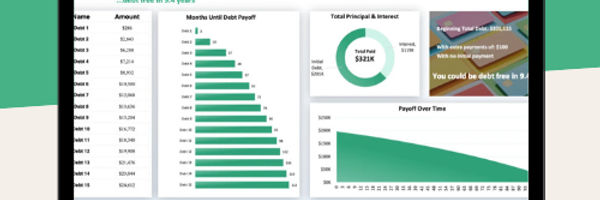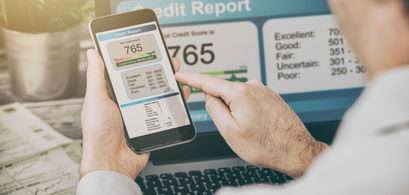Unless someone's independently wealthy, a credit score is an important number and can determine their financial well-being. Scores are used by both lenders and creditors to predict if an individual is going to pay their bills promptly; thereby influencing decisions to extend credit or approve a loan.

Lay out your credit card debt with the minimum payments and interest to see how long it will take to pay off!
What you will get:
Interactive dashboard
Customizable to your needs
Stay on track with charts and graphs
Suitable for up to 16 or 32 debts!

Credit Scoring
In this article, we're going to provide information on the credit reporting and scoring process. That discussion will also include information about credit rating agencies, and how these agencies go about calculating a score.
We're also going to help answer the question: "What is a good credit score?" We'll do this by providing statistics and trends on a national basis. Finally, we're going to provide insights into the ways consumers can improve their scores. To understand timelines, visit our article where we outline how long it takes to build credit.
Credit Reports and Credit Scores
Credit rating agencies, or credit bureaus, calculate scores based on historical payment patterns. Payments include monthly bills such as credit card and utility bills as well as loans. Much of the information used to calculate a credit score is found in a credit report. That's good news because as a result of the Fair Credit Reporting Act, everyone is entitled to a free credit report annually.
While the accuracy of the information contained in a report is extremely important to understand, a score is not typically contained in this document. In fact, consumers are not entitled to receive a free credit score, only their report. Consumers wishing to obtain their scores will have to pay one of the credit agencies a nominal fee of around $15.
FICO Credit Scores
The most common score used by lenders and creditors today is the FICO® score developed by Fair Isaac. Each of the three credit bureaus calculates its own proprietary version of the FICO score. FICO proposes the following credit score ranges:
FICO Score | Rating | What It Means |
|---|---|---|
<580 | Poor | Signals to lenders that you're not a trustworthy borrower |
580-669 | Fair | Below average, but many lenders will approve loans |
670-739 | Good | Most lenders consider it to be a good score |
740-799 | Very Good | Demonstrates that you're a very dependable borrower |
800+ | Exceptional | Demonstrates that you're an exceptional borrower |
While the credit scales vary among different agencies, the changes tend to be minute. A credit score of 710, for example, is likely to be considered "good" for many agencies and lenders alike.
Those scores are sold to lenders and creditors who want to understand the risk of nonpayment they are taking before deciding to lend someone money or waive a deposit.
The names used by each of the credit bureaus include:
Credit Bureau | FICO Score |
|---|---|
Equifax | BEACON® |
Experian | Experian / Fair Isaac Risk Model |
TransUnion | EMPIRICA® |
Calculating a FICO Credit Score
A consumer's score is calculated separately by each of the three credit rating agencies based on information reported to them by utilities, credit card issuers, phone companies, and other creditors and lenders. The components used in the calculation of a FICO score includes:
Increasing Credit Scores
We're going to finish up by talking about ways to improve a credit score. Individuals who had trouble paying bills in the past, or would like to increase their score can take the following steps:
Pay Bills on Time: mail checks or send electronic payments before their due dates. A chronic pattern of sending in payments late will lower a credit score over the long haul.
Decrease Debt: if at all possible, payoff loans or outstanding credit balances; doing so will help raise scores.
Decrease Outstanding Credit: while owning a large number of credit cards or opening up multiple lines of credit can make people feel more financially secure, this habit lowers their scores.
Stop Applying for New Credit: only apply for credit when it's really needed; recent applications for new credit will lower a score in the short term. You should also note that you don't need a credit card to build credit. If you already have a credit card, you can use it to build your credit score. If you absolutely have to, there are low-limit, guaranteed approval credit cards and unsecured credit cards that are designed specifically for bad credit.
Be Patient: Getting an 800+ credit score takes time and care, but you will be set to reach it if you follow these steps.

Lay out your credit card debt with the minimum payments and interest to see how long it will take to pay off!
What you will get:
Interactive dashboard
Customizable to your needs
Stay on track with charts and graphs
Suitable for up to 16 or 32 debts!

Credit Repair Services
There is only one legitimate action an individual can take to repair their credit score: Get a free online credit report, and make sure it's accurate.
Individuals with poor credit scores oftentimes look to companies offering repair services for help. It's important to understand the only legal way to increase a score is by the means mentioned above, fixing mistakes appearing on a report.
Credit Building Credit Cards
While not applying for more credit right away is often the right course of action, you may want to get a credit card in time to help (re)build your credit. In that case, credit builder cards, as well as credit cards for bad credit can be your savior.
Cards as such usually have low credit limits and a high APR to start with - this helps lenders mitigate the risk of losing money if you can't pay them back. A high APR means you'll be charged large amounts of interest if you can't pay your debt in time, so it's paramount that you do.
We reviewed some of the best credit builder cards available on the market today:




